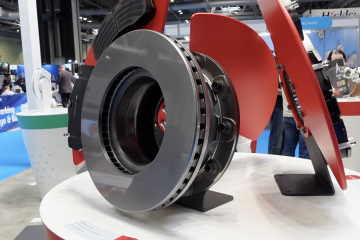
The Campaign for Safer Roadside Rescue and Recoveryis driven by Sam Cockerill, whose partner Steve Godbold was killed after being hit by a lorry on the hard shoulder of the M25, as he was loading a vehicle onto his flatbed. It has gained the support of a number of groups, including the recovery Industry Support Charity (RISC).
Now, a new All Party Parliamentary Group (APPG) has been established to discuss roadside recovery operator (RRO) safety, following the issue being raised by Tracey Crouch MP in the House of Commons. Auto Repair Focus spoke to her to find out more about the campaign she is supporting, and what can be done to improve conditions.
Can you tell me a bit about the cause you’re highlighting?
It’s been well documented what happened to Steve Godbold, and Sam, his partner, lives locally. She came to see me about the campaign they were launching to give roadside recovery operators a bit more protection when they are there doing their jobs, which many drivers find essential.
When she explained the limitations that recovery operators have now, I was genuinely surprised. Sam had already started raising awareness about the working conditions that roadside workers and recovery operators endure.
Steve was killed when he was recovering a vehicle on the M25, pretty much instantly, after the vehicle he was attending to was hit by a lorry on the hard shoulder. The driver of the vehicle, Nathen, tried to give him CPR and get him to safety. He is also part of the campaign.
When Sam and the team behind the campaign came to see me, I was a minister, and therefore couldn’t be seen to be in support of an APPG, although I could do so behind the scenes. Having stepped down from my position, it’s allowed me to have more of a voice on the issue.
I have never broken down on the motorway, but even the idea of it drives fear. However, I have been out with Kent police on a number of occasions, witnessing programs where vehicles are pulled over on the side of busy roads. Even though you are ‘in the zone, in the moment’ watching what the police are doing, you are also very conscious that you are on the side of a road with HGVs thundering past you.
With the APPG formed and the cause highlighted, what are the next steps?
The APPG does not want to be just a talking shop, it wants to gather some evidence and put forward really solid proposals to government on this issue. I think we’re already fully signed up to many of the campaign asks, the fact that RROs can only use amber lights at the moment when they would like to use red lights, as this alters driver behaviour, I think is an absolute no brainer – I can’t see why they couldn’t be allowed to do that.
The gathering of data and getting better forms of this I also think is extremely important, and again it seems like not too much of a hard ask.
I think the two objects that are harder to meet are that the campaign wants to stop the roll out of all-lane motorways until other protections are in place or the issues of road safety are taken into account. That is a lot harder as this is a strategic approach that has been taken to deal with the vast increase in the amount of traffic that runs through our road network at the moment.
But that is not to say it is not an important part of having a proper understanding of the dangers of smart motorways and if we have better protections and awareness of what to do if you see a broken-down vehicle then the smart motorway is fine.
How would the move to red lights help?
There are actual neurological responses in seeing a red light, in that is is different to how you react when seeing an amber light. Firstly, you see a red light sooner, so you would acknowledge it further away. Secondly, the red-light spells danger in your mind, so you automatically change your responses and driving habit.
We don’t think there is any reason why this cannot be implemented straight away, and if there is a reason, we are looking for it. This is a traffic legislation, so we don’t even think there is any legislative change required, which is good, so we think it is just a swipe of a pen, but we need to find out for certain.
Do you think the advancement of smart motorways has heightened the need for RRO safety?
Not really, because Steve was killed on the hard shoulder of the M25, so it wasn’t a smart motorway. However, people are becoming more aware now that there is no hard shoulder on some stretches of road, and therefore RROs are going to be working not on a hard shoulder, but directly in a lane, if the vehicle has not broken down in an emergency refuge area.
Is there anything else that can be done?
Adopting the ‘slow down move over’ that they use in the United States is important as well, they bought it in in all 50 states and it is an enforceable process that means if you see a broken-down vehicle, as it says, you slow down and move over. If you don’t it is the same traffic offence as speeding. I think having that better awareness of what to do when you see that broken-down vehicle is therefore something that can easily be written into the highway code, for example.
For the last ten to fifteen years, drivers have had to do a written theory test, so adding something into this about what to do when you notice a car, van or lorry by the side of the road will raise driver awareness.
The AAPG is also keen to make sure that we don’t just talk about motorways. This extends to other roads on the UK network. There are just as many accidents on A roads, for example, while being a recovery operator on a country road is just as dangerous. We are keen therefore to make sure it is not just about motorways.
I also think that people think that people forget the industry is wider than just the two or three main brands, and actually quite a lot of the RROs are either self-employed or part of a small subcontracted group, which is what Steve was. They don’t necessarily have the whole ‘safety in numbers’ approach. I was told that the RAC only has 52 flatbeds for the whole country.
Therefore, the independents are the ones that are going out and picking up broken down vehicles.
Does the backing of yourself and Sir Mike Penning MP help to boost the campaign?
Mike is the chairman of the AAPG, and then there are 20 other MPs or parliamentarians. I think it certainly gives it a parliamentary focus. One of the things I was struck by when talking to Sam, and then to some of the operators, at the recent AAPG meeting, was how they felt their voices hadn’t been heard for a long time. They have, on many occasions, spoken out about their fears for their safety, and no one has taken any notice.
I think the AAPG gives them the voice they haven’t had for a very, very long time, so that has to be a positive outcome in itself.
What are the next steps?
We are going to gather some evidence and present that to the Secretary of State for Transport, we will develop a short, medium and long-term plan together with a program of activity. I think that we want to gather data that we can then present as well. Ultimately this is with the goal of implementing new safety measures.




You must be logged in to post a comment.